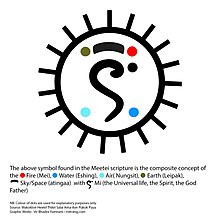 Global Information
Global InformationClassical element information


| Classical elements |
|---|
The classical elements typically refer to earth, water, air, fire, and (later) aether which were proposed to explain the nature and complexity of all matter in terms of simpler substances.[1][2] Ancient cultures in Greece, Angola, Tibet, India, and Mali had similar lists which sometimes referred, in local languages, to "air" as "wind" and the fifth element as "void".

These different cultures and even individual philosophers had widely varying explanations concerning their attributes and how they related to observable phenomena as well as cosmology. Sometimes these theories overlapped with mythology and were personified in deities. Some of these interpretations included atomism (the idea of very small, indivisible portions of matter), but other interpretations considered the elements to be divisible into infinitely small pieces without changing their nature.
While the classification of the material world in ancient India, Hellenistic Egypt, and ancient Greece into air, earth, fire, and water was more philosophical, during the Middle Ages medieval scientists used practical, experimental observation to classify materials.[3] In Europe, the ancient Greek concept, devised by Empedocles, evolved into the systematic classifications of Aristotle and Hippocrates. This evolved slightly into the medieval system, and eventually became the object of experimental verification in the 1600s, at the start of the Scientific Revolution.[4]
Modern science does not support the classical elements to classify types of substances. Atomic theory classifies atoms into more than a hundred chemical elements such as oxygen, iron, and mercury, which may form chemical compounds and mixtures. The modern categories roughly corresponding to the classical elements are the states of matter produced under different temperatures and pressures. Solid, liquid, gas, and plasma share many attributes with the corresponding classical elements of earth, water, air, and fire, but these states describe the similar behavior of different types of atoms at similar energy levels, not the characteristic behavior of certain atoms or substances.
- ^ Boyd, T.J.M.; Sanderson, J.J. (2003). The Physics of Plasmas. Cambridge University Press. p. 1. ISBN 9780521459129. LCCN 2002024654.
- ^ Ball, P. (2004). The Elements: A Very Short Introduction. Very Short Introductions. OUP Oxford. p. 33. ISBN 9780191578250.
- ^ Al-Khalili, Jim (2009). Science and Islam. BBC.
- ^ "Chemistry in the Ancient World". Nature. 140 (3554): 1006. 1 December 1937. Bibcode:1937Natur.140Q1006.. doi:10.1038/1401006a0. ISSN 1476-4687. S2CID 44886438.